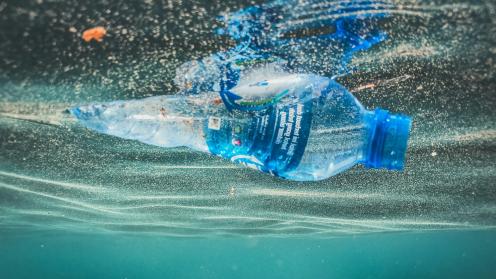Plastic pollution is worsening every year, as one delegate stated, urging for a timely financial mechanism to halt the worst impacts, especially for the most vulnerable of the world. Delegates convened on day 4 of the fourth session of the Intergovernmental Negotiating Committee (INC-4) to develop an international legally binding instrument (ILBI) on plastic pollution, including in the marine environment. While passing the halfway mark of the meeting, delegates were confronted with a slew of definitional challenges.
Want to dig deeper into today's talks? Read the full Earth Negotiations Bulletin daily report.
Meeting throughout the day in subgroup and contact group settings, delegates were able to conclude a full first reading of the Revised Draft Text, discussing their priorities for the future treaty. Some of the provisions discussed contained wording that has neither been defined nor been fully agreed, including vital terms like “lifecycle approach” and “problematic plastic.” With a non-stop programme throughout the day on Friday, many spoke about the need for robust definitions, with some others candidly sharing that without a common understanding “we will not be able to agree.”
Subgroups met throughout the day, addressing:
- Fishing gear, and problematic and avoidable plastics;
- Financing, specifically a dedicated fund for the implementation of the treaty;
- Downstream aspects in the lifecycle of plastics, including waste management and existing plastic pollution;
- Preliminary provisions for the future ILBI; and
- Awareness-raising, education and research, stakeholder engagement, health aspects, and institutional arrangements of the eventual governing body of the future treaty
In their discussions on fishing gear, views diverged on whether this gear should be subject to a lifecycle approach. Several supported this, noting that abandoned, lost or otherwise discarded fishing gear was one of the initial reasons bringing delegates together to discuss plastic pollution. Others noted the links to artisanal fisheries, cautious of creating unnecessary burdens on vulnerable fisher communities.
On problematic and avoidable plastics, views diverged on several fronts: whether a uniform definition of problematic plastic exists; whether any measures proposed to address these products will be applied at the global level or only at the national level; and whether the measures proposed to address these products would be voluntary or mandatory. This is a core part of the future treaty, and addressing these divergences will be vital if the INC is to ensure a robust agreement on plastic pollution.
In their discussions on a potential stand-alone financial mechanism, delegates considered whether to adopt a hybrid approach, with the Global Environment Facility acting as the treaty’s financial mechanism in the interim as discussions towards a standalone fund are ongoing, much like what was done in relation to the Access and Benefit Sharing Mechanism under the Biodiversity of Areas Beyond National Jurisdiction (BBNJ) Treaty. Others suggested a stand-alone mechanism as a multilateral, and independent Fund, built on opportunities and limitations of existing funds from other Multilateral Environmental Agreements (MEAs), particularly the multilateral fund under the Montreal Protocol.
They also took stock of the negotiations thus far, both in contact group and plenary settings. During the evening plenary, they agreed, on an exceptional basis, to work in three parallel meetings when necessary, until the commencement of textual negotiations. They also considered the establishment of a legal drafting group.
To receive free coverage of global environmental events delivered to your inbox, subscribe to the ENB Update newsletter.
All ENB photos are free to use with attribution. For INC-4 please use: Photo by IISD/ENB - Kiara Worth






























































